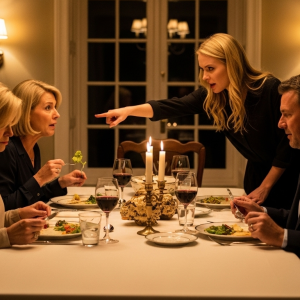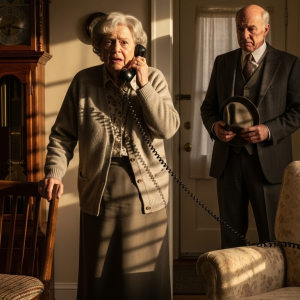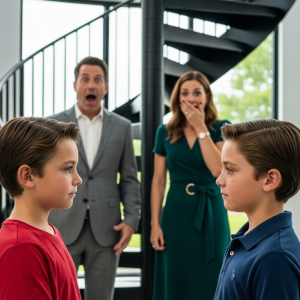The phone felt like a block of ice in my hand, a harbinger of the coldness that was about to shatter my world. I was in my immaculate kitchen, wiping down the marble countertops after arranging a bouquet of winter roses, when the call came.
“Mom,” Alistair began, her voice having that flat, clinical tone she’d adopted since she started that dreadful job. “I’m calling to let you know that you shouldn’t come for Christmas this year. I won’t be hosting you.”
The words didn’t compute at first. It was a pronouncement, not a request. Utterly devoid of respect. I gripped the edge of the counter, the chilled stone biting into my palm. Hosting me? I host Christmas. I have hosted Christmas every year for thirty years. It is my gift to this family, a bastion of warmth and tradition in a cold world.
“What did you just say to me?” I asked, my voice barely a whisper. I was giving her a chance to take it back, to realize the monstrous thing she had just said.
“I said I’m not having you over for Christmas,” she repeated, that same cold, even tone. “I think it’s best if we spend the holiday apart.”
My son Dorian, who had been in the next room, must have heard the tremor in my voice. He was by my side in an instant, his face a mask of protective fury. He took the phone from my trembling hand. “What is wrong with you?” I heard him say into the receiver. “She’s your mother! Fine. You want to be alone and miserable? We’ll just pretend we don’t know you.”
He was defending me. My wonderful boy, always so loyal. He understands what family means. Alistair’s reply was inaudible, but Dorian hung up the phone with a look of disgusted disbelief. He put his arm around me. “Don’t worry, Mom. We’ll have our own Christmas. A better one.”
But how could it be? A family Christmas with a fractured family isn’t a celebration; it’s a wake. To understand the cruelty of that call, you have to understand my Christmases. They are perfect. Not by accident, but through months of planning. The food, the decor, the carefully coordinated family portraits—it’s all a symphony I conduct to create one perfect day of joy and togetherness for the people I love.
Alistair has always been the discordant note.
Even as a child, she was… serious. Somber. While Dorian was out making friends and shining, Alistair was inside with a book, her brow furrowed. I hoped she’d grow out of it. Instead, she leaned in. She became a doctor—an oncologist, of all things. A profession centered on the bleakest parts of life. Of course, we were proud, but did she have to bring it home with her?
At holidays, when we were meant to be light and joyful, she would insist on talking about her patients, her work, the general misery of the world. It was draining. “Must we bring the hospital to the dinner table? It’s so morbid,” I once said, trying to gently guide the conversation back to something more pleasant. Dorian would try to help, making a little joke to lighten the mood. But Alistair would just retreat into a stony silence, as if we had personally insulted her. She made us all feel like monsters for simply wanting to be happy.
Every gift, every interaction, was fraught with her sensitivity. A beautiful cashmere sweater I gave her was met with a flat, “Thank you.” No enthusiasm. She’d give us dense, academic books. We’d try to be gracious, saying, “What a very serious choice,” and she would take it as an insult. She simply never understood that the point of a holiday is to escape from the ugliness of the world, not to wallow in it.
The Christmas before, when my own mother was ill, was the hardest. Alistair was her caregiver, and of course, we were grateful. But she wore her sacrifice like a shroud. On Christmas Day, I pulled her aside, desperate to salvage the mood. “I do hope you’re not going to bring your ‘work vibes’ to the party,” I whispered, smiling to show I wasn’t angry. “It’s a day for joy, not for… all that.” I was pleading with her, really. Just give us one day. But she looked at me with those cold, judgmental eyes. My mother passed two weeks later, and I know Alistair blames us for not being as publicly miserable as she was.
This year, without her, Christmas was hollow. Dorian tried his best. He brought his new girlfriend, Sienna, over on Christmas Day. She was a delight—an artist, beautiful, from a good family. She was perfect for him, a ray of sunshine. After dinner, Dorian had an idea. He said, “You know what? We should at least stop by Alistair’s. It’s Christmas. We should show her we’re the bigger people.” It was such a noble thought.
They went. I waited by the phone, praying for a breakthrough. An hour later, Dorian came back. Alone. His face was pale, his jaw tight. “She broke us up,” he said, his voice cracking. “Alistair. She turned Sienna against me.”
I can only imagine what lies Alistair must have whispered to that poor girl. She must have twisted our family jokes, our gentle chiding, into something monstrous. She had sabotaged her own brother’s happiness out of pure spite. That night, I saw Alistair for what she had become: not just a gray cloud, but a storm, determined to wreck everything beautiful in her path.
The calls started five days later. Dorian called her first, heartbroken and furious. He told me she was cold, unfeeling. Then it was my turn.
“Alistair, you have ruined this family!” I cried, the tears I’d been holding back finally spilling over. “Dorian is heartbroken! That girl, Sienna, she was perfect! Do you know how long I’ve waited for him to find someone like that? You have to call her. Tell her it was a misunderstanding. Tell her you were just being overly sensitive and that we all love you very much. You need to apologize.” It was a simple path to fixing everything. She just needed to admit she’d been wrong.
Her response was a single word. “No.”
It was the coldest sound I had ever heard. “No? What do you mean, no?”
“This isn’t about Sienna, Mom,” she said, her voice full of a chilling, false strength. “She left because, for the first time, someone from the outside saw you clearly.”
The arrogance of it. The cruelty. To suggest that we were the problem. That I was the problem.
“But… but he loves her,” I stammered, trying to make her see the human cost of her actions.
“And I loved you,” she replied, as if her love were a thing of the past. Then she hung up on me. On her own mother.
She blocked our numbers. All of us. Her father, Dorian, me. It was an amputation. She cut her family out of her life as cleanly as she would cut a tumor from a patient, and with just as much emotion. My sister Sharon tried to call her, to reason with her, but Alistair was resolute. She told Sharon that being a family shouldn’t require someone to set themselves on fire to keep everyone else warm. What a dramatic, self-pitying thing to say. All we ever asked of her was to bring a little light, a little smile. We were cold because she refused to provide any warmth.
The weeks that followed were the worst of my life. The house is a mausoleum. Dorian is a ghost of himself. My husband and I argue constantly; the stress of it all is breaking him. He even had to sell his grandfather’s watch to cover some unexpected bills Alistair used to help with. The entire foundation of our lives has cracked, because its most difficult, unstable piece decided to explode.
Last week, I wrote her a letter. I poured my heart onto the page. I didn’t blame her. I simply told her how much we were all suffering, how much her absence hurt, how much I missed my daughter. I begged her to come home so we could be a family again. Sharon forwarded it for me.
There has been no reply.
I stand in my kitchen, which feels too large and too quiet now, and I look at the family portraits on the wall. In every single one, we are smiling. Perfect. Happy. It wasn’t a lie. It was a goal. It was a reality I built with my own two hands, year after year. A reality she chose to burn to the ground. They say grief is for the loss of good things. They are wrong. The deepest grief is for the loss of a child who is still alive, a child who looked at the beautiful home you built for her and chose, for reasons you will never understand, to walk out the door and never look back.
After blocking the last number, an absolute, deafening silence descended upon my apartment. It was a quiet I had craved for years, yet its sudden totality was jarring. My body, so accustomed to being coiled in anticipation of the next slight or the next passive-aggressive demand, didn’t know how to unclench. I stood in the middle of my living room, the festive lights of my small Christmas tree blinking against the window, and felt the phantom limb of my family ache.
There was no triumph, no righteous surge of victory. There was only the vast, hollow space where a lifetime of obligation used to be. The decision to sever the cord was an act of self-preservation, but it felt like an amputation nonetheless. I had cut off a part of myself, and my spirit was still trying to send signals to a limb that was no longer there. Grief, I realized, wasn’t just for the loss of good things; it was for the loss of the hope that things could ever be good.
For the next few days, I moved through a fog. I went to work, immersing myself in the clinical, life-and-death clarity of the oncology ward. There, I was Dr. Hayes. I was competent, needed, and respected. My actions had clear, measurable outcomes. But when I came home to my quiet apartment, I was just Alex, a person untethered from the only family narrative I had ever known. I found myself instinctively reaching for my phone to tell my mom about a difficult case, or to remind Dorian about a bill, only to have my thumb hover over a contact that no longer existed.
Every familiar holiday tradition now felt like a ghost. The scent of gingerbread, the sound of a carol on the radio—they all carried a fresh sting. This was the peace I had chosen, but I hadn’t understood that the price of peace would be a profound and aching loneliness. I was free, but I was floating, unsure of which way was up.
A week into the new year, an email appeared in my inbox. The sender’s name was Sienna Alma. My heart did a nervous flip. I almost deleted it, assuming it was a Trojan horse—some new tactic from my family to breach the walls I had built. But curiosity, and a memory of the genuine horror in her eyes that night, made me click it open.
The email was short and direct.
Dear Dr. Hayes,
I hope this email finds you well. I apologize for the intrusion, and I want to apologize again for the way my presence at your home on Christmas became a catalyst for such a painful situation. I can’t stop thinking about it.
I also can’t stop thinking about what you did for my grandmother, Alma. After I left your apartment, I went home and read through her old journals. She wrote about you. She called you her ‘fierce, quiet warrior.’ She said you were the first doctor who saw her as a person, not just a set of symptoms.
I know you are not responsible for Dorian’s or his family’s actions, but I wanted you to know that your kindness had an impact that has lasted long after you left my grandmother’s hospital room. It certainly had an impact on me.
This is a long shot, but I would be honored to buy you a coffee or tea sometime. Not to talk about Dorian, but just to say thank you, properly.
Sincerely, Sienna
I read the email three times. It was a lifeline. It was a voice from the outside world confirming that I wasn’t insane, that the goodness I tried to put into the world was real, even if my own family couldn’t see it. I hesitated for a full day, then wrote back a simple reply: I would like that very much.
We met at a quiet coffee shop downtown, halfway between my hospital and her studio. She was even more striking in person, with an artist’s intensity in her eyes. The first few minutes were awkward, two strangers connected only by a shared, traumatic event.
“I ended things with Dorian that night,” she said, stirring her tea. “It wasn’t just what he said about you. It was… the way he said it. The way your mother talked about you later on the phone. The entitlement. It was like they saw you as a resource, not a person.”
“That’s the most accurate description I’ve ever heard,” I admitted, a sad smile touching my lips.
We didn’t talk much more about my family. Instead, she told me stories about her grandmother, Alma. She told me how, in that final year you gave her, Alma had taken up watercolor painting, filling notebooks with wobbly, vibrant paintings of flowers and birds. She had reconciled with her own estranged sister. She had lived.
“She wasn’t just waiting to die,” Sienna said, her eyes bright with tears. “She was learning how to live again. That’s what you gave her.”
I talked about what it was like to be her doctor, about Alma’s fierce humor and her refusal to be pitied. For an hour, we built a bridge between us made of shared memories of a woman we both admired. When we parted ways, I felt lighter than I had in years. I had been seen. The friendship that began that day was tentative at first, but it was built on a foundation of mutual respect—something I had never realized was missing from my life.
Just as I started to feel a sense of normalcy, the predictable next wave of the attack came. It was a call from an unknown number. I reluctantly answered.
“Alistair, honey? It’s your Aunt Sharon.”
My mother’s sister. A woman whose heart was in the right place, but whose spine was made of jelly. She was the family’s designated peacekeeper, which usually meant she was the one sent to deliver the guilt trips.
“Oh, I’m so glad I reached you,” she began, her voice fluttering with anxiety. “Honey, this has all gone too far. Your mother is beside herself. She just weeps all day. And Dorian… well, the poor boy is a wreck since that lovely Sienna girl left him. He’s not himself at all.”
I took a breath, anchoring myself. “I’m sorry to hear they’re having a hard time, Aunt Sharon.”
“Well, you can fix it!” she said, her voice gaining a hopeful edge. “She’s your mother, Alistair. Life is too short for this kind of… ugliness. Whatever happened, can’t you just call her? Smooth things over for the sake of the family?”
The old me would have caved. The guilt would have been a physical force, crushing my resolve. But the new me, the one who had shared a coffee with Sienna and remembered her own worth, held firm.
“Aunt Sharon, I love you, but my peace is not up for negotiation anymore,” I said calmly. “And being a family shouldn’t require one person to set themselves on fire to keep everyone else warm.”
There was a stunned silence on her end. “Well, I… I never thought of it like that,” she stammered. Then, her voice dropping to a conspiratorial whisper, she added, “It’s just… things are a mess over there, honey. With you not… helping out… I heard your father had to sell that watch he loved so much. And they’re arguing constantly. Mark and Jessica are at each other’s throats. Your mother just doesn’t know what to do.”
I felt a pang of sadness, a dull ache for the people they were, or the people I had once wished them to be. But it was quickly followed by a cold, hard clarity. The system had collapsed because its primary host was no longer available. Their dysfunction had been subsidized for years. Now that the funding was cut, the whole rotten structure was caving in on itself.
“That’s not my burden to carry anymore,” I said, my voice gentle but final. “I have to go. It was good to hear from you.” I ended the call before she could protest further.
Months passed. Winter thawed into a cool, bright spring. My friendship with Sienna deepened. We discovered a shared love for old movies and hiking. We talked about her art and my research. She never asked for anything, and I never felt the need to perform. It was easy. It was real.
One Saturday afternoon, as we were walking through a park, a letter arrived. It was from my mother, forwarded by Aunt Sharon, her familiar, looping handwriting on the envelope. I held it in my hands, feeling its weight.
The old Alex would have been consumed. My day, my week, would have been lost to a storm of anxiety. I would have agonized over whether to open it, what it might say, how I should respond. The letter would have held all the power.
But as I stood there, with the sun on my face and my friend by my side, I felt only a distant, quiet pity. I knew what would be inside. Not a true apology, but a carefully worded plea disguised as one. A list of her pain, her suffering, with a final, hook-laden line about how much she missed her daughter, designed to reel me back in.
Sienna saw the look on my face. “You don’t have to open that,” she said softly.
And I realized she was right.
I looked at the letter, this final, desperate attempt to reclaim control over my emotional landscape. Then I looked at Sienna, who was smiling at me, waiting patiently. I saw the path back to the chaos, the drama, the endless cycle of hurt and obligation. And I saw the path forward, into the sunshine, into a life I was building for myself, one respectful, honest connection at a time.
I slid the unopened letter into my coat pocket.
“So,” I said, turning my back on the past and my face toward my future. “Have you ever tried the ramen place over on Elm Street? I hear it’s the best in the city.”
Her face lit up. “No! I’ve been dying to go.”
As we walked, I didn’t throw the letter away. Not yet. For now, it served as a reminder, a small, paper-thin testament to the weight I no longer had to carry. My family was a story I had finished reading. It was time to start writing a new one.




